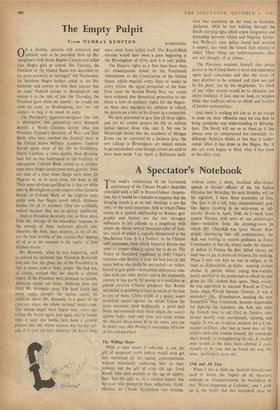The Empty Pulpit
From MURRAY KEMPTON wASBINGToN ON a Sunday, persons still unknown and unlikely ever to be punished blew up Bir- mingham's 16th Street Baptist Church and killed four Negro girls at school. On Tuesday, the President of the United States was described by his press secretary as 'outraged.' On Wednesday, six Southern Negro leaders asked to see Mr. Kennedy and convey to him their request that he order Federal troops to Birmingham and restore it to the rule of law. On Thursday, the President gave them his answer: he would not send an army to Birmingham, but two old soldiers to beg it to mend its ways.
The President's appeasers-designate (the title is descriptive, not pejorative) were Kenneth Royall, a North Carolina lawyer who was President Truman's Secretary of War, and Earl Blaik, who once coached the football team at the United States Military Academy. General Royall spent most of his life in Goldsboro, North Carolina, a town 'gentler than Birming- ham but no less habituated to the tradition of segregation. Colonel Blaik retired as a cavalry- man when Negro cavalrymen were groonis. They are men of a time when things were done for Negroes or, as in most cases, not done at all. Their most obvious qualification is that no white man in Birmingham could suspect either General Royal! or Colonel Blaik of the slightest sym- pathy with that Negro revolt which Alabama blames for all its troubles. They are certifiably neutral because they are so plainly indifferent.
And so President Kennedy slid, in three days, from the outrage of his immediate response to the remedy of these irrelevant ghostly mis- sionaries. He feels, then, helpless, as we all do; not the least terrible of the realities that oppress, all of us at the moment is the reality of how helpless we are.
Mr. Kennedy, when he was beginning, used to remind his intimates that Theodore Roosevelt had said that one great use of the Presidency is that it makes such a 'bully pulpit.' He had not, of course, noticed that the church is almost empty. If the President were disposed to preach, Alabama would not listen. Alabama does not think Mr. Kennedy cares. The hard South has never really thought the nation cared; its cyniism about Mr. Kennedy is a piece of its cynicism about the whole national moral tone. The nation might have begun nine years ago telling the South again and again that it meant what it said; this would have been a painful process and one whose success was hardly cer- tain. It is now too late; whatever the South does must come from within itself. The Royall-Blaik mission would have been a poor beginning in the Birmingham of 1954; now it is only pitiful.
The Negro's rights as a free man have since his emancipation rested on the Fourteenth Amendment to the Constitution of the United States, which requires every State to render to every citizen the equal protection of the laws. Ever since the Second World War, our courts have widened that theoretical protection to em- brace a host of ancillary rights for the Negro: no State may segregate his children in school, his person on a bus, or his dinner in a restaurant.
We have pretended to give him all these rights, and yet we cannot protect his life or enforce justice against those who take it. No one in Mississippi thinks that the murderer of Medgar Evans can be convicted by a Jackson jury; the new killings in Birmingham are almost certain to go unpunished, even though arrests are said to have been made. Last April, a Baltimore mail- man was murdered on the road to Gadsden, Alabama, while he was walking through the South carrying signs which urged integration and friendship between whites and Negroes. Gover- nor Wallace's state police found and arrested a suspect; last week the Grand Jury refused to indict. These things are embarrassments; they are not thought of as crimes.
The President reminds himself that police justice in the United States is local and dependent upon local conscience and that the worst of men deserves to be arrested and tried not just by his peers, but by his neighbours. TO think of any other system would be to abandon our entire tradition of law, and we look on helpless while that tradition serves as shield and buckler of lawless communities.
And there is nothing left for us to do except to send the least offensive men we can find to bring sympathy and understanding to Birming- ham. The South will see us in them as it has always seen us, embarrassed but essentially in- different. America thinks at last that it under- stands what it has done to the Negro. But it has not even begun to think what it has done to the white man.










































 Previous page
Previous page